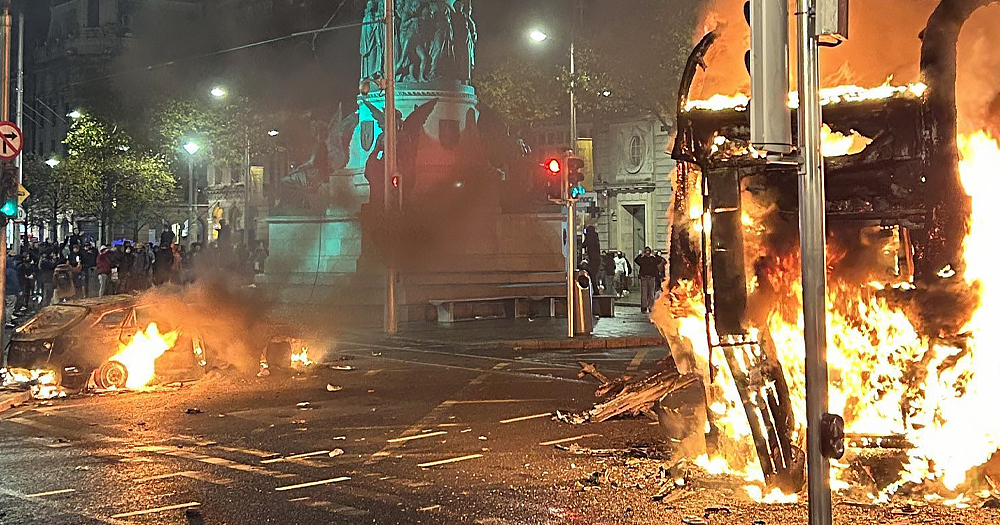On Wednesday, November 20, a man was jailed after pleading guilty to arson, violent disorder and criminal damage in connection to the Dublin riots.
Declan Donaghey, of Williams Place Upper, appeared before the Dublin Circuit Criminal Court, where he was jailed in connection to last year’s riots. His involvement was shown to the court in CCTV footage, where Donaghey could be seen putting a burning box inside a patrol car. After, he appeared to wipe the handle of the door, as he wasn’t wearing gloves.
“That subsequently led to the vehicle being completely destroyed by fire,” Detective Inspector Ken Hoare told the court.
Donaghey then proceeded to damage a second garda car by smashing the windows and jumping on the bonnet. He also threw a wheelie bin at another patrol car. The valuation of the damages amounted to €20,000, with a further €8,000 done to the other vehicle.
Following these incidents, Donaghey moved to attack an accommodation housing around 50 international protection applicants. He threw a bicycle saddle at the building while it was attacked by other rioters. The owner, who had seen the public disorder on the internet, had closed all the shutters and turned off the lights, but the building was still targeted.
In a handwritten letter read before the court, Donaghey said he was “not a racist” and had only acted in the spur of the moment because he had a close relation in the school where a brutal knife attack had taken place earlier that day, causing injuries to three children and an adult. In the letter, he also apologised “to the government and everyone involved”.
During the sentencing, Judge Orla Crowe said that Donaghey’s offending was of a very serious nature, describing his actions as “shameless and senseless vandalism” and saying that any attack on gardaí is “an attack on all of society”.
The judge did not accept Donaghey’s claims that he acted in a moment of madness, pointing out that he was on the street for two hours during the riots and committed several crimes over a 14-minute period. She also said that his motives “do not stand up” and described how he was “an active, spirited participant”.
Judge Crowe also took into account his plea of guilt in relation to the events of the Dublin riots, the fact that he had never been jailed before and that he had accepted to work on his rehabilitation. She then sentenced him to seven-and-a-half years for arson, with the final year suspended to encourage rehabilitation.
Moreover, she added four-and-a-half years for the violent disorder charge and three years for the criminal damage charge. All sentences are to run concurrently.
The judge said that Donaghey was “a participant in one of the gravest public order incidents in the history of the state”.
The Dublin riots broke out on November 23, 2023, when crowds gathered in the city centre and violence escalated, with rioters attacking police officers, setting cars and public transport on fire, and smashing and looting shops. Many were chanting anti-immigration slogans while carrying out the destruction.
In a bid to make more arrests, on November 19 this year, gardaí published photos of 99 “persons of interest” they want to speak to in connection to the riots, urging people with relevant information to come forward. The images were captured via CCTV footage, which gardaí have been analysing as part of the ongoing investigation.
At the time of writing, 18 people have been identified following the publication of the photos. In a statement released yesterday evening, An Garda Síochána said they continue “to receive a very significant public response to this appeal for information”.
The Irish Council for Civil Liberties (ICCL) expressed concern about the online publication of these people’s photos. “While issuing photos is common practice, the scale of today’s publication is unprecedented,” its statement read.
“When issuing photos, gardaí must be in compliance with various laws, including data protection. They also need to consider the principles of necessity and proportionality when they release images to the media – they need to determine that it is necessary and that such publicity is in the public interest.
“Today’s publication also raises questions and concerns about people’s right to presumption of innocence and right to a fair trial, if charged with a crime.”
© 2024 GCN (Gay Community News). All rights reserved.
Support GCN
GCN is a free, vital resource for Ireland’s LGBTQ+ community since 1988.
GCN is a trading name of National LGBT Federation CLG, a registered charity - Charity Number: 20034580.
GCN relies on the generous support of the community and allies to sustain the crucial work that we do. Producing GCN is costly, and, in an industry which has been hugely impacted by rising costs, we need your support to help sustain and grow this vital resource.
Supporting GCN for as little as €1.99 per month will help us continue our work as Ireland’s free, independent LGBTQ+ media.
